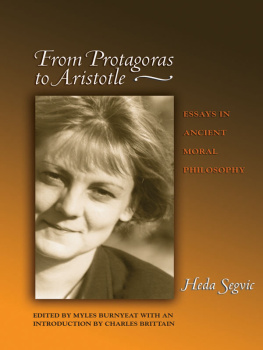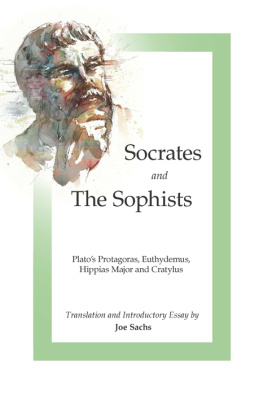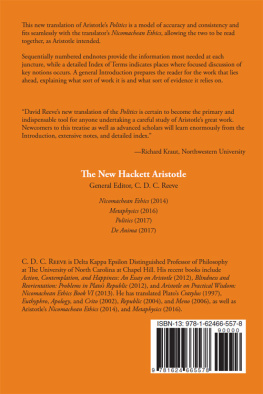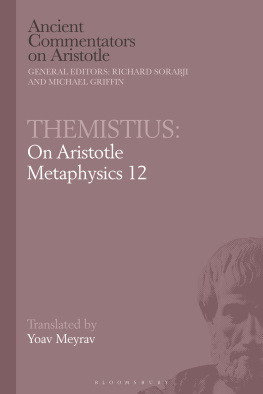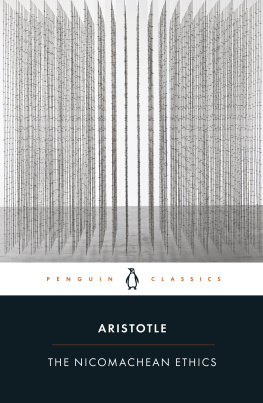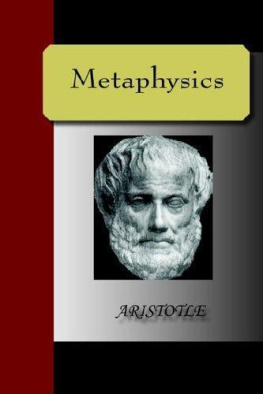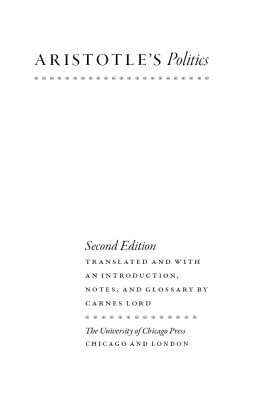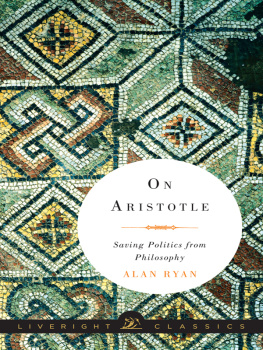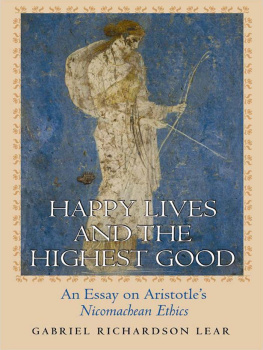
From Protagoras to Aristotle
From Protagoras to Aristotle
ESSAYS IN ANCIENT MORAL PHILOSOPHY
Heda Segvic
Edited by
Myles Burnyeat
With an Introduction by Charles Brittain
PRINCETON UNIVERSITY PRESS PRINCETON AND OXFORD
Copyright 2009 by Princeton University Press
Published by Princeton University Press, 41 William Street, Princeton New Jersey 08540
In the United Kingdom: Princeton University Press, 6 Oxford Street, Woodstock, Oxfordshire OX20 1TW
All Rights Reserved
Library of Congress Cataloging-in-Publication Data
Segvic, Heda, 1957
From Protagoras to Aristotle : essays in ancient moral philosophy / Heda Segvic; edited by Myles Burnyeat; with an introduction by Charles Brittain.
p. cm.
Includes bibliographical references and index.
ISBN 978-0-691-13123-8 (hardcover : alk. paper) 1. EthicsHistory. I. Burnyeat, Myles. II. Title.
BJ101.S44 2008
170.938dc22
2008016967
British Library Cataloging-in-Publication Data are available
This book has been composed in Goudy
Printed on acid-free paper.
press.princeton.edu
Printed in the United States of America
10 9 8 7 6 5 4 3 2 1
C ontents
A cknowledgments
T hese essays originally appeared in the publications listed below. Permission from the publishers to reprint them is gratefully acknowledged.
1. Protagoras Political Art in Rhizai: A Journal for Ancient Philosophy and Science 2 (2004): 734. Sofia, Bulgaria: East-West Publishing House.
2. Homer in Platos Protagoras in Classical Philology 101 (2006): 247262. Chicago: University of Chicago Press.
3. No One Errs Willingly: The Meaning of Socratic Intellectualism in Oxford Studies in Ancient Philosophy 19 (2000): 145. Oxford University Press.
4. Aristotle on the Varieties of Goodness in Apeiron: A Journal for Ancient Philosophy and Science 37 (2004): 151176. Kelowna, B.C., Canada: Academic Publishing and Printing.
5. Aristotles Metaphysics of Action in Philosophiegeschichte und logische Analyse / Logical Analysis and History of Philosophy 5 (2002): 2353. Mentis-Verlag, Paderborn, Germany.
6. Deliberation and Choice in Aristotle in Moral Psychology and Human Action in Aristotle, ed. Giles Pearson and Michael Pakaluk (Oxford: Oxford University Press, 2008).
7. Aristotle, Nicomachean Ethics, trans. Roger Crisp in Utilitas 14 (2002): 408412. Cambridge: Cambridge University Press.
8. Two or Three Things We Know about Socrates in Stanford Agora: An Online Journal of Legal Perspectives 1 (2004): 4750.
I ntroduction
H eda Segvic died on March 12, 2003, at the age of forty-five. Her unexpected death meant the loss of an intensely loyal friend for those who knew her, and the end of the passionate philosophical engagement her friendship implied. She had published little, because she saw her role as a historian of ancient philosophy as one that required more than precise reconstructions of historical arguments through careful scholarship: she wanted to achieve a real understanding of what she took to be a still urgent set of questions about practical reason. At the time of her death, she had made public only a brilliant reevaluation of Socratic intellectualism and a provocative defense of Aristotles theory of actionenough to make clear to those who did not know her the intensity and originality of her thought, but no more.
Since then, however, four of her papers have been published posthumously, so that it is now possible to present a representative selection of her work on ancient ethics. The six essays on Protagoras, Socrates, and Aristotle and two shorter pieces collected here were not intended as contributions to a single project. (Heda had plans for a book on Socratic intellectualism and a monograph on Aristotles theory of practical knowledge.) But they are unified by their intense focus on a distinctive set of concerns about practical reason and an overarching historical thesis that lay behind much of her thinking about ancient ethics: Aristotle was the philosophical heir of Protagoras, as well as of Socrates. The essays develop this historical thesis indirectly through the analysis of the competing conceptions of the nature and function of practical reason in the two earlier philosophers (essays 13), and the elucidation of three topics in Aristotles moral theory that reflect his revision and integration of their views (essays 46). The result is inevitably incomplete both as a historical thesis and as a philosophical investigation of practical reason. But the collection reveals Heda as a striking thinkerand writerwhose work merits, and rewards, further philosophical engagement.

Hedas unconventional work was the product of a complicated life. She was born on the 24th of April, 1957, in Split, in Croatia, where she had the benefit of a classical education of a rigor long since abandoned in the noncommunist world. After a brief spell at Zagreb University in Croatia, she took her undergraduate degree in Belgrade (197782), the capital city of her country, Yugoslavia. There she began her lifelong study of Aristotle and formed the interests
The influence of her teachers (and later friends) at Princeton on her work on ancient philosophy is evident from the topics she pursued through the rest of her lifeSocratic intellectualism, the development of a notion of the will, and Aristotelian practical reasonand in her determination to derive philosophically rich results from the close study of ancient texts in their original languages. (Harry Frankfurt, whose work on the will became a contemporary standard against which to test her reflections on its early history, should also be listed among her mentors.) Her own influence on her fellow students at the timecertainly in her last three years at Princeton, when I came to know herwas just as strong: she shone out for her kindness and loyalty, no less than her philosophical brilliance and intensity, in a highly competitive environment.
Her life at Princeton was complicated, however, by two catastrophes: the breakup of her marriage to a philosopher and historian of philosophy who inspired her, Raymond Geuss, and the civil war in Yugoslavia, which saw her country torn apart, threatened her family, and lost her the only home she ever owneda flat in Belgrade expropriated by the new Serbian authorities. Despite all her joy in the company of friends and in the enjoyment of beautyespecially the complex and passionate beauty of classical operaHeda did not fully recover from the long exile from Europe and emotional insecurity caused by these events until the final six months of her life.
In 1992, she took a position at the University of California, Santa Barbara. She was exhilarated by the natural beauty of the ocean and the hills, but felt cut off from Europe and the community of ancient philosophy. An initial remedy was a visiting position at Stanford (199394), where she benefited from the philosophical company of Julius Moravscik. But she needed a permanent community. She thought she had found it in 1995, when she took a position in the Department of Philosophy at the University of Pittsburgh. At Pittsburgh, she gained much, especially from her colleagues John McDowell and James Allen (the influence of the former on her understanding of Aristotelian ethics is clear in her essays). But in the end she lost first her faith in academic institutions, then her health, and finally her life.
Next page
